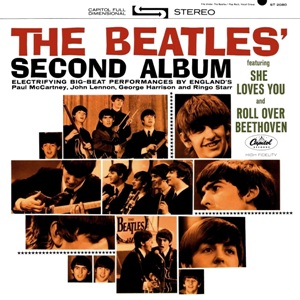
The Beatles' Second Album is the second Capitol Records album by the English rock band the Beatles, and their third album released in the United States including Introducing... The Beatles, which was issued three months earlier by Vee-Jay Records. Following its release in April 1964, The Beatles' Second Album replaced Meet the Beatles! at number 1 on the Billboard Top LPs chart in the US. The album was compiled mostly from leftover tracks from the UK album With the Beatles and Long Tall Sally EP, which are predominantly rock and roll and R&B covers, and rounded out with several Lennon-McCartney-penned non-album b-sides and the hit single "She Loves You". Among critics, it is considered the band's purest rock and roll album and praised for its soulful takes on both contemporary black music hits and original material.

Long Tall Sally is the fifth UK EP release by British rock band the Beatles and the band's first UK EP to include songs not previously released on an album or single in the United Kingdom. It was released by Parlophone in mono, with the catalogue number GEP 8913, and released in the United Kingdom on 19 June 1964. It was also released in Spain and France.

"You Won't See Me" is a song by the English rock band the Beatles from their 1965 album Rubber Soul. It was written by Paul McCartney and credited to Lennon–McCartney. As with songs such as "We Can Work It Out" and "I'm Looking Through You" from the same period, the lyrics address McCartney's troubled relationship with Jane Asher and her desire to pursue her career as a stage and film actress. The Beatles recorded the song during what author Mark Lewisohn describes as a "marathon" final recording session for Rubber Soul, to ensure the album's pre-Christmas release.
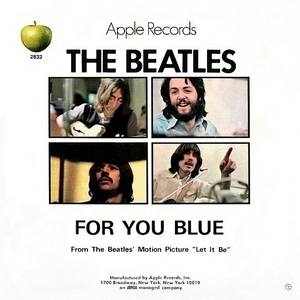
"For You Blue" is a song by the English rock band the Beatles from their 1970 album Let It Be. The track was written by George Harrison as a love song to his wife, Pattie Boyd. It was also the B-side to the "Long and Winding Road" single, issued in many countries, but not Britain, and was listed with that song when the single topped the US Billboard Hot 100 and Canada's national chart in June 1970. On the Cash Box Top 100 chart, which measured the US performance of single sides individually, "For You Blue" peaked at number 71.
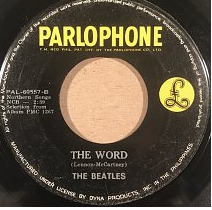
"The Word" is a song by English rock band the Beatles, written by John Lennon and Paul McCartney and recorded with Lennon on lead vocals. It was first released on their 1965 album Rubber Soul.
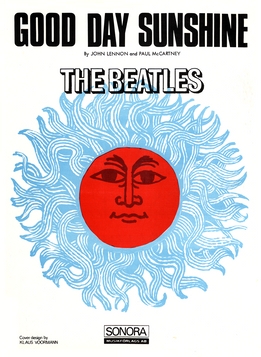
"Good Day Sunshine" is a song by the English rock band the Beatles from their 1966 album Revolver. It was written mainly by Paul McCartney and credited to the Lennon–McCartney partnership. McCartney intended it as a song in the style of the Lovin' Spoonful's contemporaneous hit single "Daydream". The recording includes multiple pianos played in the barrelhouse style and evokes a vaudevillian mood.

"You're Going to Lose That Girl" is a song by the English rock band the Beatles from their 1965 album and film Help! Credited to the Lennon–McCartney songwriting partnership, the song was mostly written by John Lennon with contributions from Paul McCartney.
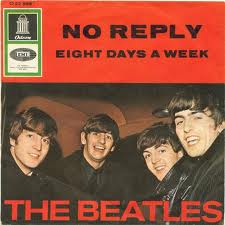
"No Reply" is a song by the English rock band the Beatles from their 1964 album Beatles for Sale. In North America, it was issued on Capitol Records' variant on the British release, Beatles '65. The song was written mainly by John Lennon and credited to Lennon–McCartney. Lennon originally gave the song to another artist managed by Brian Epstein, Tommy Quickly, in June 1964, but Quickly decided not to use it. The Beatles recorded the track in London soon after returning from their first full tour of the United States. The lyrics typify Lennon's more introspective and mature songwriting on the Beatles for Sale album.
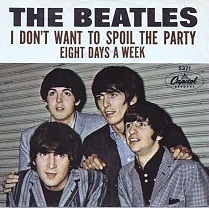
"I Don't Want to Spoil the Party" is a song by the English rock band the Beatles, written by John Lennon and credited to Lennon–McCartney. It was released on the album Beatles for Sale in the United Kingdom in December 1964. "I Don't Want to Spoil the Party" was also released on the Beatles for Sale EP.

"If I Fell" is a song by English rock band the Beatles which first appeared in 1964 on the album A Hard Day's Night in the United Kingdom and United States, and on the North American album Something New. It was written primarily by John Lennon and credited to Lennon–McCartney. "That's my first attempt at a ballad proper. ... It shows that I wrote sentimental love ballads way back when", Lennon stated in his 1980 Playboy interview. Paul McCartney stated that he contributed to the song: "We wrote 'If I Fell' together."
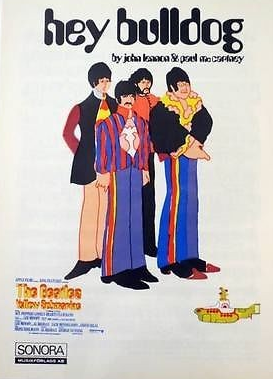
"Hey Bulldog" is a song by the English rock band the Beatles released on their 1969 soundtrack album Yellow Submarine. Credited to Lennon–McCartney, but written primarily by John Lennon, it was finished in the recording studio by both Lennon and Paul McCartney. The song was recorded during the filming of the "Lady Madonna" promotional film, and, with "Lady Madonna", is one of the few Beatles songs based on a piano riff.

"Old Brown Shoe" is a song by the English rock band the Beatles. Written by George Harrison, the group's lead guitarist, it was released on a non-album single in May 1969, as the B-side to "The Ballad of John and Yoko". The song was subsequently included on the band's compilation albums Hey Jude, 1967–1970 and Past Masters, Volume Two. Although "Old Brown Shoe" remains a relatively obscure song in the band's catalogue, several music critics view it as one of Harrison's best compositions from the Beatles era and especially admire his guitar solo on the track.
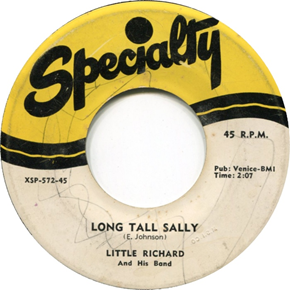
"Long Tall Sally", also known as "Long Tall Sally (The Thing)", is a rock and roll song written by Robert "Bumps" Blackwell, Enotris Johnson, and Little Richard. Richard recorded it for Specialty Records, which released it as a single in March 1956, backed with "Slippin' and Slidin'".
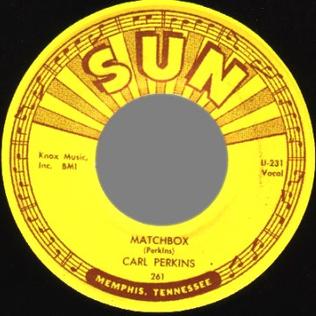
"Matchbox" is a song written and recorded by Carl Perkins and released in 1957. Blind Lemon Jefferson wrote and recorded a song entitled "Match Box Blues" in 1927, which is musically different but which contains some lyric phrases in common.
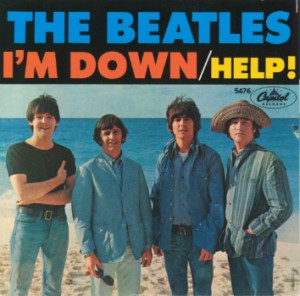
"I'm Down" is a song by the English rock band the Beatles, written by Paul McCartney and credited to Lennon–McCartney. It was released on a non-album single as the B-side to "Help!" in July 1965. The song originated in McCartney's attempt to write a song in the style of Little Richard, whose song "Long Tall Sally" the band regularly covered.
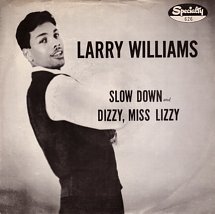
"Dizzy, Miss Lizzy" is a rock and roll song written and recorded by Larry Williams in 1958. Although identified as a "genuine rock & roll classic", it had limited success on the record charts. Seven years later, the Beatles recorded the song, and John Lennon performed it with the Plastic Ono Band in 1969.
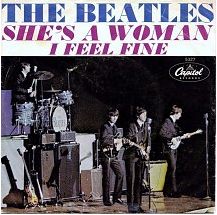
"She's a Woman" is a song by the English rock band the Beatles, written primarily by Paul McCartney and credited to Lennon–McCartney. It was released on a non-album single in November 1964 as the B-side to "I Feel Fine", except in North America, where it also appeared on the album Beatles '65, released in December 1964. Though it was the B-side, it charted in the US, reaching number four on the Billboard Hot 100 and number eight on the Cash Box Top 100. The song originated in McCartney's attempt to write a song in the style of Little Richard. The lyrics include the first reference to drugs in a Beatles song, with the line "turn(s) me on" referring to marijuana.

"Bad Boy" is a song written and recorded by American R&B musician Larry Williams. Specialty Records released it as a single in 1958, but it failed to reach the U.S. Billboard charts. However, music journalist Stephen Thomas Erlewine calls it one of Williams's "genuine rock & roll classics" and notes its popularity among 1960s British Invasion groups, such as the Beatles.

"Kansas City" is a rhythm and blues song written by Jerry Leiber and Mike Stoller in 1952. First recorded by Little Willie Littlefield the same year, as "K. C. Loving", the song later became a chart-topping hit when it was recorded by Wilbert Harrison in 1959. "Kansas City" is one of Leiber and Stoller's "most recorded tunes, with more than three hundred versions", with several appearing in the R&B and pop record charts.

"It's Only Love" is a song by the English rock band the Beatles, written by John Lennon and credited to Lennon–McCartney. It was first released in 1965 on the Help! album in the United Kingdom and on the Rubber Soul album in the United States.














